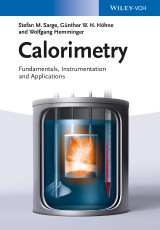Details

Calorimetry
Fundamentals, Instrumentation and Applications2. Aufl.
|
76,99 € |
|
| Verlag: | Wiley-VCH |
| Format: | |
| Veröffentl.: | 25.02.2014 |
| ISBN/EAN: | 9783527649396 |
| Sprache: | englisch |
| Anzahl Seiten: | 304 |
DRM-geschütztes eBook, Sie benötigen z.B. Adobe Digital Editions und eine Adobe ID zum Lesen.
Beschreibungen
Clearly divided into three parts, this practical book begins by dealing with all fundamental aspects of calorimetry. The second part looks at the equipment used and new developments. The third and final section provides measurement guidelines in order to obtain the best results. <br> The result is optimized knowledge for users of this technique, supplemented with practical tips and tricks.<br> <br>
INTRODUCTION: Calorimetry: Definition, Application Fields and Units<br> <br> Definition of Calorimetry<br> Application Fields for Calorimetry<br> First Example from Life Sciences<br> Second Example from Material Science<br> Third Example from Legal Metrology<br> Units<br> <br> PART I: Fundamentals of Calorimetry<br> <br> METHODS OF CALORIMETRY<br> Compensation of the Thermal Effect<br> Measurement of Temperature Differences<br> Summary of Measuring Principles<br> <br> MEASURING INSTRUMENTS<br> Measurement of Amount of Substance<br> Measurement of Electric Quantities<br> Measurement of Temperatures<br> Chemical Composition<br> <br> FUNDAMENTALS OF THERMODYNAMICS<br> States and Processes<br> Phases and Phase Transitions<br> <br> HEAT TRANSPORT PHENOMENA<br> Heat Conduction<br> Convection<br> Heat Radiation<br> Heat Transfer<br> Entropy Increase during Heat Exchange<br> Conclusions Concerning Calorimetry<br> <br> SURROUNDINGS AND OPERATION CONDITIONS<br> The Isothermal Condition<br> The Isoperibol Condition<br> The Adiabatic Condition<br> The Scanning Condition<br> <br> MEASUREMENT AND EVALUATION<br> Consequences of Temperature Relaxation within the Sample<br> Typical Results from Different Calorimeters<br> Reconstruction of the True Sample Heat Flow Rate from the Measured Function<br> Special Evaluations<br> Determination of the Measurement Uncertainty<br> <br> PART II: Practice of Calorimetry<br> <br> CALORIMETERS<br> Functional Components and Accessories<br> Heating Methods<br> Cooling Methods<br> Comments on Control Systems<br> Thermostats<br> On the Classification of Calorimeters<br> On the Characterization of Calorimeters<br> Isothermal Calorimeters<br> Calorimeters with Heat Exchange between Sample and Surroundings<br> Adiabatic Calorimeters<br> Other Calorimeters<br> <br> RECENT DEVELOPMENTS<br> Microchip Calorimetry<br> Microchip Calorimetry<br> Extreme Ranges of State<br> Calorimetry as an Analytical and Diagnostic Tool<br> <br> CALORIMETRIC MEASUREMENTS: GUIDELINES AND APPLICATIONS<br> General Considerations<br> Guidelines to Calorimetric Measurements<br> Calorimetric Applications<br> <br> Index
Stefan M. Sarge studied chemistry at the Braunschweig University of Technology. Since 1990 he has worked for the Physikalisch-Technische Bundesanstalt (PTB) in Braunschweig, which is the National Metrology Institute of Germany providing scientific and technical services at the highest level of accuracy and reliability for the benefit of society as a whole, trade and industry, and science.<br> He is the Head of the Working Group on Caloric Quantities and the author of several publications in the fields of thermal analysis, calorimetry and legal metrology. In 1990 and 2004 he received the Netzsch-GEFTA award.<br> <br> Gunther W. H. Hohne studied chemistry, physics and mathematics at the Technical University of Berlin. In 1997 he was appointed Privatdozent (Adj. Professor) after his habilitation in experimental physics. From 1970 until his retirement in 1999 he was Head of the Section for Calorimetry of the University of Ulm, with duties including academic teaching in physics. <br> From 1999 to 2008 he was a visiting professor at the Eindhoven University of Technology. He has published numerous articles and two monographs on calorimetry and its applications. In 2002 he received the science award of the German Society of Thermal Analysis (GEFTA).<br> <br> Wolfgang Hemminger studied physics at the University of Stuttgart and worked for a couple of years at the Braunschweig University in the field of materials science using calorimetry as one tool of research. In 1981 he joined the PTB and worked in the fields of thermal conductivity and various thermoanalytical methods. <br> In 1989 he was appointed Head of the PTB Division "Thermodynamics and Explosion Protection". <br> He was co-editor of the journal Thermochimica Acta and is the author of numerous journal articles and books. In 1981 he received the Netzsch-GEFTA award and in 2006 the GEFTA science award.<br>
Clearly divided into three parts, this practical book begins by dealing with all fundamental aspects of calorimetry. The second part looks at the equipment used and new developments. The third and final section provides measurement guidelines in order to obtain the best results. <br> The result is optimized knowledge for users of this technique, supplemented with practical tips and tricks.<br>


















